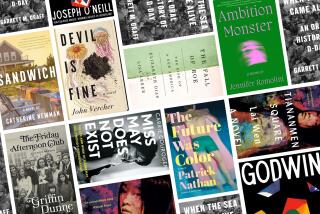Bombeck’s Tale of Young Survivors
- Share via
Tuesday was a typical Erma Bombeck day. On a hectic tour to promote her new book, the syndicated columnist got a flat tire while racing from a television interview to the New York airport. Her plane to Washington was late and then became “surgically attached to the jetport,” so that it couldn’t take off even when ready. The driver in Washington took her to the wrong hotel and by the time a reporter phoned her at 7 p.m., she was “eating lunch.”
But Bombeck wasn’t fazed. Her book, about children surviving cancer, has changed her life, she says.
“I’ve been relaxed all day. I told myself I’ll get there when I can, and even if I can’t I will at least have had a great journey.”
And that is the essence of “I Want to Grow Hair, I Want to Grow Up, I Want to Go to Boise” (Harper & Row, $16.95). It’s about children with cancer beating the odds, having fun, telling the same goofy jokes and playing the same dumb tricks that children everywhere like to play. It’s about “the chemo cut,” when your hair falls out due to chemotherapy and you think up crazy answers to the oft-asked question “What happened to your hair?” It’s about mothers who feel guilty that they can’t “kiss it and make it better” and fathers who learn that children are “awarded for an indefinite length of time, over which they have no control.”
And it’s about sisters and brothers, like those of 3-year-old Darlene, who swung into action when she was diagnosed with cancer. To alleviate her fears of the dark and of radiation, the five siblings played a sort of game with their little sister: They wrapped her in a white sheet, lay her on the kitchen table, turned on the microwave (for sound) and turned out the lights. They put the portable sewing machine lid over her head and thumped it with their fingers. The time was increased each night, starting with 30 seconds. When she finally went for radiation treatments, she wasn’t afraid.
The book is filled with kooky tales, like the one about the kid who removed her artificial leg and positioned it in the car window, so potential car thieves would think someone was inside. Or the notice that informed a camper’s mother: “Your child broke his leg today. Please send a new one up on the train.”
Mostly, it’s by and about the kids themselves, explaining how they feel about life, death and what they’ve lived through--and attempting to help others in the same boat. Bombeck says the book began as a pamphlet, requested by a summer camp director who asked for something to give potential campers “a little shot of optimism.”
They Intend to Grow Old
Bombeck had trepidations, she admits, but visited the camp for kids with cancer and found that they “had every intention of living long enough to go to Disneyland, drive their mothers crazy, live in bedrooms that should be condemned, go to the prom . . . and grow old.”
She then spent two years meeting similar survivors, listening to their sagas, and soliciting their written remembrances about what happened when cancer struck.
The result is an optimistic, upbeat compendium of tales from the cancer underground, written in true Bombeckian style. The souffle lightness of it all makes it an easy read. But within its pages are kernels of truth, courage and hope that make this essential reading for anyone about to travel the road that these children and their families have traveled.
Bombeck says there have been many “wonderful, poignant books about a particular child, from diagnosis to death. But what we needed at this point is to say that ‘It is doable.’ You can win. You can stay alive. The odds get better every day--from 40% to 90% of children with cancer now survive--and you don’t have to roll over and just give in to it any more.”
Proceeds to Cancer Research
The author has contributed her $1.5 million advance fee to cancer research and will contribute all proceeds from the book to that same cause.
What is also needed, she said, is to “change everyone’s attitude” so that people stop treating these kids with pity and fear. They must be treated like the survivors they are.
Or, as one boy told Bombeck: “I had a teacher last year who shouted at me on the first day of school, ‘Sit down and be quiet!’ She treated me like everyone else. I knew it was going to be a good year.”
More to Read
Sign up for our Book Club newsletter
Get the latest news, events and more from the Los Angeles Times Book Club, and help us get L.A. reading and talking.
You may occasionally receive promotional content from the Los Angeles Times.










